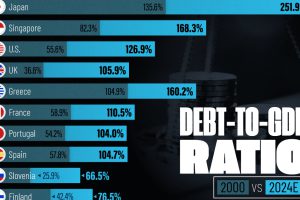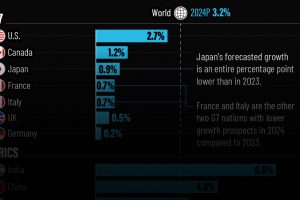Will You Outlive Your Savings?
The desire to live longer — and outrun death — is ingrained in the human spirit. The first emperor of China, Qin Shi Huang, may have even drank mercury in his quest for immortality.
Over time, advice for living longer has become more practical: eat well, get regular exercise, seek medical advice. However, as life expectancies increase, many individuals will struggle to save enough for their lengthy retirement years.
Today’s infographic comes from New York Life Investments, and it uncovers how holding a stronger equity weighting in your portfolio may help you save enough funds for your lifespan.
Longer Life Expectancies
Around the world, more people are living longer.
| Year | Life Expectancy at Birth, World |
|---|---|
| 1960 | 52.6 years |
| 1980 | 62.9 years |
| 2000 | 67.7 years |
| 2016 | 72.1 years |
Despite this, many people underestimate how long they’ll live. Why?
- They compare to older relatives.
Approximately 25% of variation in lifespan is a product of ancestry, but it’s not the only factor that matters. Gender, lifestyle, exercise, diet, and even socioeconomic status also have a large impact. Even more importantly, breakthroughs in healthcare and technology have contributed to longer life expectancies over the last century. - They refer to life expectancy at birth.
This is the most commonly quoted statistic. However, life expectancies rise as individuals age. This is because they have survived many potential causes of untimely death — including higher mortality risks often associated with childhood.
Longevity Risk
Amid the longer lifespans and inaccurate predictions, a problem is brewing.
Currently, 35% of U.S. households do not participate in any retirement savings plan. Among those who do, the median household only has $1,100 in its retirement account.
Enter longevity risk: many investors are facing the possibility that they will outlive their retirement savings.
So, what’s the solution? One strategy lies in the composition of an investor’s portfolio.
The Case for a Stronger Equity Weighting
One of the most important decisions an investor will make is their asset allocation.
As a guide, many individuals have referred to the “100-age” rule. For example, a 40-year-old would hold 60% in stocks while an 80-year-old would hold 20% in stocks.
As life expectancies rise and time horizons lengthen, a more aggressive portfolio has become increasingly important. Today, professionals suggest a rule closer to 110-age or 120-age.
There are many reasons why investors should consider holding a strong equity weighting.
- Equities Have Strong Long-Term Performance
Equities deliver much higher returns than other asset classes over time. Not only do they outpace inflation by a wide margin, many also pay dividends that boost performance when reinvested.
- Small Yearly Withdrawals Limit Risk
Upon retirement, an investor usually withdraws only a small percentage of their portfolio each year. This limits the downside risk of equities, even in bear markets.
- Earning Potential Can Balance Portfolio Risk
Some healthy seniors are choosing to work in retirement to stay active. This means they have more earning potential, and are better equipped to recoup any losses their portfolio may experience.
- Time Horizons Extend Beyond Lifespan
Many individuals, particularly affluent investors, want to pass on their wealth to their loved ones upon their death. Given the longer time horizon, the portfolio is better equipped to ride out risk and maximize returns through equities.
Higher Risk, Higher Potential Reward
Holding equities can be an exercise in psychological discipline. An investor must be able to ride out the ups and downs in the stock market.
If they can, there’s a good chance they will be rewarded. By allocating more of their portfolio to equities, investors greatly increase the odds of retiring whenever they want — with funds that will last their entire lifetime.





